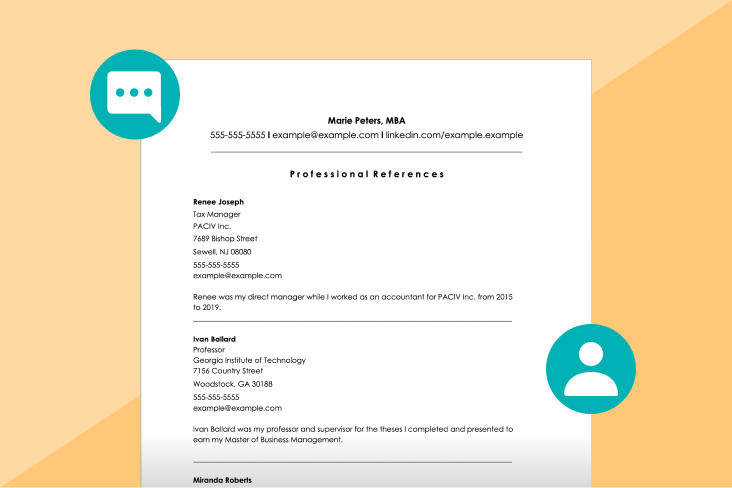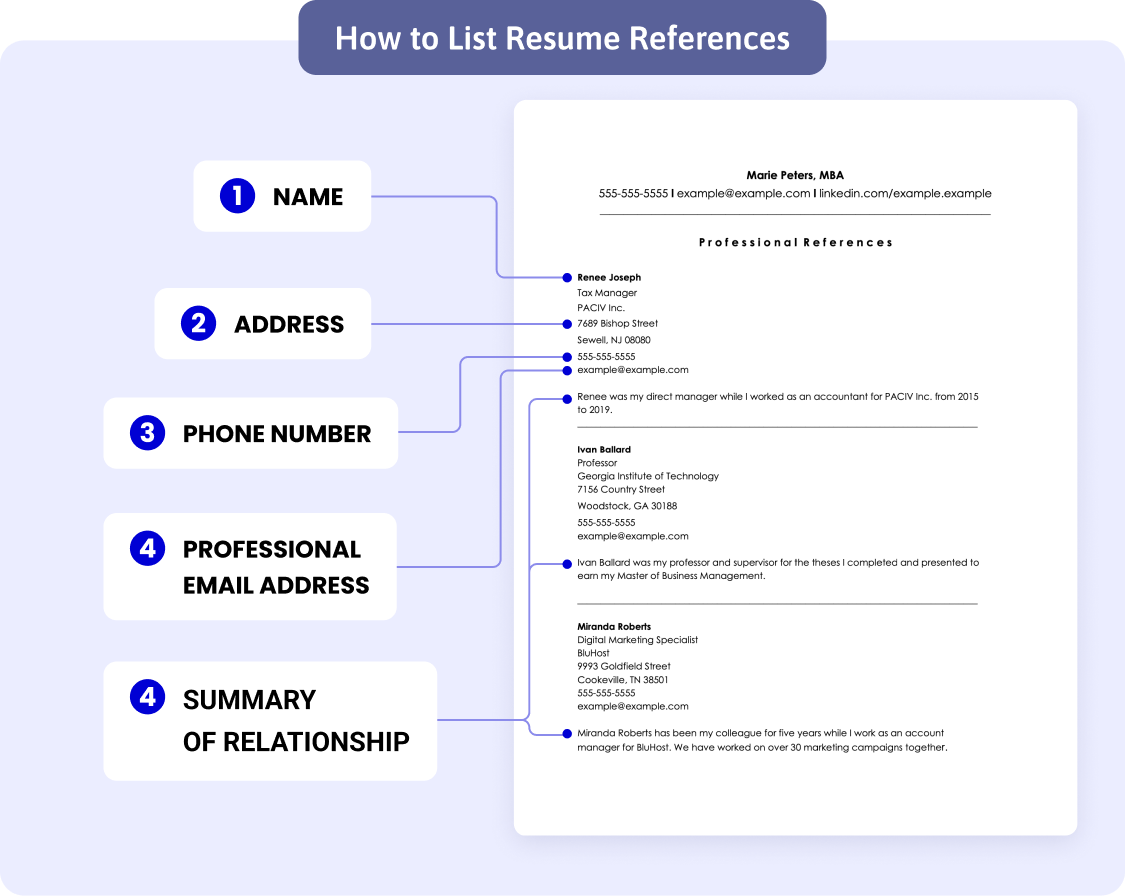References on Resume: Should You Include Them?
Should you put references on a resume? The short answer is no. List them in a separate document if asked for them. Learn how to list your resume references correctly and find examples to make it easier.
Hired By:*


What are references
on a resume?
References for a job are people who can speak positively about your skills, work ethic, experience, and character. Employers may contact them to verify your qualifications and get insight into what it’s like to work with you.
Do You Put References on a Resume?
Including references directly on your resume is no longer standard practice. If an employer wants them, it’s best to provide a separate document titled “References” or “Professional References.”
Why? Because space on your resume is valuable. Listing references or even including the phrase “References available upon request” uses space that’s better spent showcasing your skills, experience, and achievements. Since recruiters typically scan resumes in seconds, you want every line to count.
When the time comes, have a clean, well-organized reference sheet ready to share. Until then, leave references off your resume.
Now that you know references shouldn’t go on your resume, are you ready to build a resume that impresses recruiters? Try our Resume Builder and get a customized resume that’s approved by recruiters in less than 15 minutes.
How to List
Job References
Although references should ideally stay out of your resume document, they’re still a crucial part of your job application, especially if you’re writing a college resume or an academic CV. However, it’s best to list references in a document separate from your resume if they’re requested.
You’ll need to include these details about each of your reference(s):
- Name
- Address
- Phone number
- Professional email address
- A summary of your relationship
Here’s a diagram of how to list your resume references:
- Name: List your reference’s full name. Also, it’s optional to include their professional title, like “General Manager” or “Professor.”
- Address: Add their full professional mailing address so that they may be contacted or verified. Include their business name, if applicable.
- Phone number: Include the best number to reach your reference. Cell phones are acceptable if your reference consents.
- Professional email address: Include an email that reflects the person’s name. If your reference has a funny personal email address like “pizzalover111,” an employer may not take their word seriously.
- Relationship summary: Write a brief sentence explaining how you know your reference and include the number of years you worked together or how long you’ve known each other.
When should you include references on a resume?
You should only include references on your resume or CV if the employer expressly says so in the job advertisement or application instructions. Otherwise, keep references off your resume and onto a separate document.
There are five key sections that should go in every resume:
- Contact information
- Resume summary or objective
- Work experience
- Skills
- Education
However, the resume is a highly customizable document that you can tailor to your specifications and, more importantly, the job requirements. Learn more about common extra sections in our article about How to Write a Resume.
Reference Sheet Template
Copy & Paste
Feel free to copy and paste the following template of a reference sheet to use on your job search!
[Your First/Last Name]
[Your phone #]
[Your email address]
Professional References
[Reference First/Last Name]
[Optional: Reference Job Title, “Store Manager”]
[Optional: Reference Company, e.g., “Leff Lighting”]
[Reference Address]
[Reference phone #]
[Reference email address]
[Reference description: Include a single sentence summary of your relationship to this person, like where you worked together and for how long.]
Remember that it’s standard to include two or three references in total. Usually, this is specified in the job post.
To list multiple references, do so reverse chronologically. That means starting with whom you worked with most recently at the top. Then, list your older references below.
How to Put References on a Resume
In most cases, it’s best to leave references off your resume. Including them rarely adds value and takes up space that could be used to highlight your qualifications and achievements. Instead, prepare a separate “Professional References” document to share when requested.
That said, there are two exceptions when it may be appropriate to include references directly on your resume:
- The employer specifically asks you to include references on your resume.
- The application only allows one document to be uploaded, and references are explicitly requested.
In these rare cases, you may include a references section, but do so on a separate page that follows the main part of your resume. Title the page “Professional References.”
Example of references on a resume
Professional References
Tamara Jones
Head Librarian
Peyton Community Library
23 Acacia St, Peyton, OH 98717
(555) 555-5555
t.jones@example.com
Worked under Tamara for four years as a resident archivist.
Coreen Hubert
Librarian
Riverdale Public Library
45 Oak Street, Riverdale, NY 10583
(555) 555-5555
c.hubert@example.com
Supervised my work for three years as a library assistant.
Who Should You Include
As Resume References?
Your resume references should be people who know you in a professional or academic context, not personal friends or family members (unless they’ve worked with you professionally, and even then, they’re a last resort).
Ideal references are individuals who can confidently speak to your:
- Work ethic
- Skills and strengths
- Contributions or accomplishments
- Professional attitude
These could include:
- Former managers or supervisors
- Coworkers
- Professors or academic advisors
- Business partners or clients
- Mentors
Choose two to three references who can offer specific, positive examples of your performance and character.
Pro Tip: Always ask someone for permission before listing them as a reference. This ensures they’re willing, prepared, and able to speak well about your qualifications. A surprise call from a hiring manager may lead to a vague or unhelpful response if they’re caught off guard.
Should I add references to my cover letter?
No, including references in your cover letter is unnecessary.
A cover letter is meant to introduce you, highlight your most relevant skills and experiences, and explain why you’re a great fit for the role. It’s better to provide references separately and only when an employer requests them.
Need help writing a strong cover letter? Explore our cover letter examples or try our Cover Letter Generator to craft one that complements your resume perfectly.
Key Takeaways
To recap some of the main points about references for resumes:
- Don’t include references on your resume unless the job listing specifically asks for them.
- Instead, provide references in a separate document titled “Professional References” when requested.
- Avoid using the phrase “References available upon request” on your resume or cover letter. This practice is outdated and takes up valuable space in your application documents.
- References should be people who can vouch for your skills, work ethic, and character, ideally from professional or academic settings.
- Always ask permission before listing someone as a reference to ensure they’re prepared to speak positively about you.
- A good reference entry includes the individual’s full name, job title, employer name, address, phone number, professional email, and a brief description of your relationship.
- Don’t include references in your cover letter. Instead, focus on showcasing your qualifications and fit for the job.
Resume References FAQ
Do employers check references?
Yes, many employers do check references, usually in the later stages of the hiring process. They use references to verify your work history, performance, and behavior. That’s why it’s important to choose people who will speak positively and professionally about you.
Should I put “References available upon request” on my resume?
No. This phrase is outdated and unnecessary. Hiring managers assume you’ll provide references if asked.
How do I ask someone to be a reference?
Reach out politely, preferably by phone, email, or in person, and ask if they’d be comfortable serving as your professional reference. Be clear about the type of job you’re applying for and why you think you’d be a good fit. Always thank them and follow up with your resume or job details.
Can I list friends and family as references?
It’s best not to list friends or family as references, as employers prefer professional contacts who can objectively speak to your work experience. Only include them if they’ve worked with you directly in a professional setting and can vouch for your skills with specific, relevant examples.
What should I do if I don’t have any professional references?
If you lack formal work experience, consider academic references (professors, advisors), volunteer supervisors, internship coordinators, or even clients from freelance work. You can also use character references who can speak to your reliability, communication skills, or leadership. Just be transparent about their relationship to you.
Can I use a reference from a job I was fired from?
Yes, if you left on respectful terms, and someone from that job is still willing to speak positively about your work. Focus on choosing someone who values your contributions and can highlight your strengths objectively, regardless of how the role ended.
Can I use a LinkedIn recommendation as a reference?
A LinkedIn recommendation can strengthen your online presence, but it shouldn’t replace a traditional reference. Employers typically want direct contact with your references. However, LinkedIn recommendations can be a great supplement to your application or help support your credibility.
Do I need to customize my references for each job application?
Not necessarily, but it can help! If you have multiple strong references, choose those most relevant to the role you’re applying for. For example, a tech reference for a software job or a client reference for a freelance gig.
Is it okay to reuse the same references for multiple applications?
Yes, it’s common to use the same references across multiple applications. Just make sure your references are aware you’re actively job searching, and keep them informed about the roles you’re applying for so they’re prepared if contacted.
How We Reviewed This Article
Over the past 15 years, we’ve helped more than 10 million job seekers build stronger cover letters, discover their career paths, interview confidently, and boost their chances of finding the right job faster. Review our Editorial Policy to learn more about our process.







